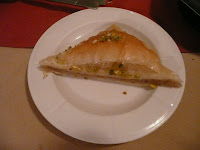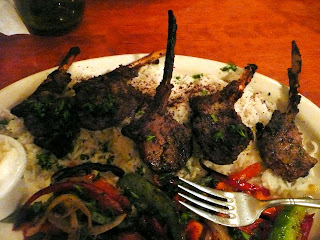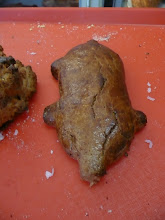Of all the different versions of the history of al pastor, I will delve into one on this day: It is very likely that the Lebanese first introduced the concept of spit-roasting meat to the Mexicans shortly after immigrating en masse to the country way back in the olden days (thanks to NYC's Bike Snob for the timeline). And it is also likely that this led eventually to the invention of Tacos al Pastor sometime not too long ago, or that is, sometime back in the day. If that were the only contribution the Lebanese made to world cuisine then they could call it good and proudly bask in the glory of what has become a taco institution and my personal all-time favorite. But no, we all know that Lebanese and Middle Eastern cuisine has been around for the last 7,000 years or so, and has its own glorious traditions that go far beyond shawarma. And luckily for us, many people from all over the Middle East have also decided to move to Denver to cook and sell food.
 As far as Middle Eastern food in Denver goes, much of it is concentrated around the I-25 and Colorado region, a little out-of-the way for me. So when Phoenician Kabob was opened last year on East Colfax by a family of Lebanese descent, I was excited to get there, but with the sloth-like pace I act on my whims, I didn't make it over until early this fall.
As far as Middle Eastern food in Denver goes, much of it is concentrated around the I-25 and Colorado region, a little out-of-the way for me. So when Phoenician Kabob was opened last year on East Colfax by a family of Lebanese descent, I was excited to get there, but with the sloth-like pace I act on my whims, I didn't make it over until early this fall. Phoenician Kabob is not on the list of late-night swhawarma stops, and it's prices reflect that. Along with entrées priced from $11 to $16, they have things like tablecloths, cloth napkins, glass drinkware and other fine dining touches. They also have a full bar and apparently on Saturday nights they have belly dancing. Gimmicky, but I don't think belly dancing ever made anything worse. And even without the belly dancing, there is plenty of good food and Almaza, a smooth, easy-to-drink Lebanese beer, to keep one occupied.
After the pig (and in close contention with the skin of a chicken), one of my favorite eating animals is the lamb. They are not only cute and fluffy, they are tender and delicious. And when freshly prepared and not over-cooked they are succulent. Lamb is a staple of Middle Eastern cuisine and takes center stage on Phoenician Kabob's menu. On previous visits I have had the lamb kabob and the kafta kabob. The former was well-done, but still tender with a nice char to the outside. The latter, a mix of ground lamb and beef rolled up into something that looks like it could have been used in lieu of a Baby Ruth to clear the pool in Caddy Shack, is often quite dry in many Middle Eastern places, but at Phoenician Kabob is moist and fresh.
The last time I was there, they had a special on the Lamb Chops and I got that. They were a little over-cooked, but just like the kabob pieces, had a wonderful blackened char crust that was addictive. They came plated with Basmati rice and perfectly sautéed bell peppers and onions that also had bits of the lamb char on them. With the garlic butter-type spread it was all rather outstanding.
 The rest of the menu is typical Middle Eastern fare but with some Lebanese touches. Among the appetizers, you really ought to try the pastry specialties. The Manakeish is a pizza-like pastry and ours was topped with thyme, olive oil, olives and sesame seeds. It was very good dipped in the dill-yogurt tzatziki sauce. Also very good was the Ara'yis, ground lamb and beef sandwiched between two thin, crisp and oily pitas. The Fatayer-- a baked empanada-like pastry stuffed with ground lamb, onions and pine nuts-- looked and sounded promising, however, was disappointing because of the hard crust on the tips that bread inevitability gets when it is microwaved too long. And at this I paused and asked our young waitress if these pastries were homemade. She said that they were, and I believe her, but they must have been re-heated in the microwave.
The rest of the menu is typical Middle Eastern fare but with some Lebanese touches. Among the appetizers, you really ought to try the pastry specialties. The Manakeish is a pizza-like pastry and ours was topped with thyme, olive oil, olives and sesame seeds. It was very good dipped in the dill-yogurt tzatziki sauce. Also very good was the Ara'yis, ground lamb and beef sandwiched between two thin, crisp and oily pitas. The Fatayer-- a baked empanada-like pastry stuffed with ground lamb, onions and pine nuts-- looked and sounded promising, however, was disappointing because of the hard crust on the tips that bread inevitability gets when it is microwaved too long. And at this I paused and asked our young waitress if these pastries were homemade. She said that they were, and I believe her, but they must have been re-heated in the microwave.Manakeish
The re-microwaved pastries are forgivable, but this is not: The pitas are not homemade or freshly baked, which is, as my 14-year-old sister-in-law might say if she grew up in the US instead of Mexico, "totally lame". There is a pita factory across the street, so they are likely somewhat fresh, but still they taste like any packaged pita from the supermarket. In fact, they are on the crappy end of the spectrum of store-bought pitas: thin, dry and tasteless. I know it’s probably a pain in the ass to make pitas fresh, but for a more upscale joint like this, I think it should be standard.
 Pretty much everything else we ate was good. The chicken kabobs are moist chunks of white meat, the falafel is crispy and well-seasoned and the gyros are tasty thick-sliced hunks of meat, but with the lame pita bread are maybe not worth ordering. The Baba Ganouj is creamy and absolutely divine. It is one of the best I have ever had. So goes with the the Baklava as well, which is served warm and is not too sweet.
Pretty much everything else we ate was good. The chicken kabobs are moist chunks of white meat, the falafel is crispy and well-seasoned and the gyros are tasty thick-sliced hunks of meat, but with the lame pita bread are maybe not worth ordering. The Baba Ganouj is creamy and absolutely divine. It is one of the best I have ever had. So goes with the the Baklava as well, which is served warm and is not too sweet.I am not one to nitpick restaurants, and I don't mind that the service is exceptionally slow at Phoenician Kabob. The host is welcoming and the wait staff is friendly, and although not entirely attentive, they work hard and are always smiling. But while the atmosphere is warm and inviting, on one recent winter night when we were dining there, the restaurant itself was like an icebox. I'm not sure if this is to cut down on heating costs, or if this is to try and get you to order up another round of Arak, an anise-flavored liquor unique to the Middle East. Either way, the food is good enough to keep me coming back, and if they start baking their own pitas it may well become one of my favorites.



















You pretty much nailed it! For this part of town this is about as good as it gets. Hebesha, the Ehtiopian restaurant next door is good also.
ReplyDeleteNice Dishes.. Wow...
ReplyDelete